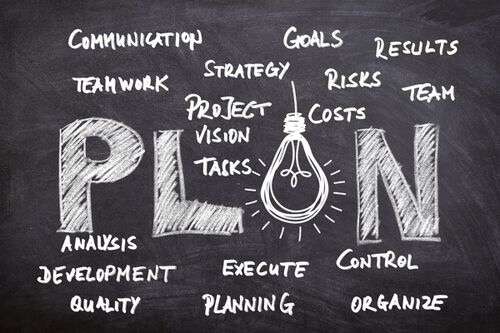Achieving Professional Growth Through Strategic Career Moves (Guest)
Achieving professional growth through strategic career moves can unlock new opportunities for advancement and fulfillment.

https://pixabay.com/photos/business-idea-planning-board-3683781/
Achieving professional growth through strategic career moves requires careful planning. Still, by aligning personal aspirations with calculated decisions, you can unlock new opportunities for advancement and fulfillment!
Understanding your career goals
If you want to further your career, you need to know where you want to take it. Here, reflecting on your values and strengths helps align your ambitions. Set SMART goals to establish clear targets. Then, evaluate your current skills and experiences to identify areas for improvement. Research various career paths within your industry to explore opportunities, too. This way, you can better grasp where you are, what you want, and how you might achieve it.
Assessing your current situation
Of course, figuring out your current situation is not as simple as it might seem. To do so, first take stock of your skills, experiences, and qualifications to gauge where you stand. Identify gaps between your present position and your desired career goals to chart a clear path forward! This introspection enables you to understand what skills or experiences you may need to acquire to progress. Additionally, it helps you recognize your strengths and areas for improvement. By assessing your current situation, you gain valuable insights into your readiness for advancement and the steps you need to take to reach your objectives. It guarantees that each step you take is purposeful and aligned with your aspirations.
Researching potential career paths
Researching potential career paths is important prep for professional growth through strategic career moves. Start by exploring different avenues within your industry to broaden your perspective. Then, explore emerging trends and job opportunities in related fields to uncover new possibilities. Networking with professionals in various sectors can also provide valuable insights into alternative career paths. Online resources such as industry reports, job boards, and professional forums offer a wealth of information to guide your research. Take the time to assess each potential path based on factors like job prospects, growth opportunities, and alignment with your interests and skills.
Networking and building relationships
Networking and building relationships will be immensely helpful for your professional growth. Start by connecting with professionals in your industry to expand your circle. Cultivate meaningful relationships with mentors and peers who can offer guidance and support along your journey. Try to engage in networking events, both online and offline, to create opportunities for collaboration and knowledge sharing. Furthermore, actively participate in industry-related forums and groups to showcase your expertise and establish credibility. Of course, networking is not just about seeking opportunities for yourself but also about offering value to others. Likewise, be genuine in your interactions and show a willingness to help and support others in their endeavors. Building strong relationships takes time and effort, but the benefits are invaluable in terms of career advancement and personal growth!
Continuous learning and skill development
Embrace opportunities for ongoing education to stay relevant in your field. Whether through online courses, workshops, or certifications, investing in enhancing your expertise is smart. These learning experiences both deepen your knowledge and broaden your skill set, making you more adaptable to evolving industry trends. Furthermore, continuous learning demonstrates your commitment to professional growth and development, enhancing your credibility among peers and employers. It’s also important to seek learning opportunities that align with your career goals and interests to derive maximum value from the experience.
Taking calculated risks
Taking calculated risks involves carefully evaluating potential outcomes and considering various scenarios before making decisions. To do this, keep in mind that while daunting, stepping out of your comfort zone often leads to significant opportunities for personal and professional growth! However, try to balance ambition and caution, weighing the risks against the potential rewards. Remember, calculated risks aren't about blindly leaping into the unknown but rather about making informed choices based on thorough consideration and preparation. Be open to learning from both successes and failures, as they provide valuable lessons that contribute to your overall development.
Making transitions quickly
Making transitions quickly is a valuable skill in today's fast-paced world, and adaptability is key when navigating change! Here, you’ll need to prioritize effective communication to facilitate smooth transitions. And, of course, if a new opportunity opens up, you need to know how to pack your workspace quickly and take full advantage of it! This way, if you prepare to move office in a hurry, you can avoid missing out on opportunities. Then, learn from past experiences to improve future transitions, too. Remember, transitions are inevitable in both personal and professional life. So, by mastering the art of making transitions quickly, you position yourself as a resilient and agile individual capable of thriving in any environment.
Seeking feedback and iterating
Actively seek input from peers, mentors, and supervisors to gain valuable insights. If you do, you can embrace constructive criticism as an opportunity for growth and improvement. As such, incorporate feedback into your approach to refine your strategies and actions. Iteration is key to continuous improvement, allowing you to adapt and evolve over time! By seeking feedback and iterating, you demonstrate a commitment to excellence and a willingness to learn from others. Still, feedback is a two-way street, so be open to both giving and receiving it graciously.
Balancing short-term gains with long-term goals
Balancing short-term gains with long-term goals is a delicate art in career planning. While short-term achievements may offer immediate gratification, try to consider their alignment with your overarching objectives. Striking a balance will mean that your actions contribute to both immediate success and long-term sustainability. So, prioritize activities that both yield short-term gains and, in some way, align with your broader vision for your future. Of course, this requires foresight and strategic decision-making to avoid sacrificing long-term progress for short-lived rewards.
Managing work-life integration
Strive for a healthy balance between professional responsibilities and personal life to avoid stress and burnout. Set boundaries to delineate work hours from personal time, allowing for relaxation and rejuvenation. Prioritize self-care activities, even if it’s just reading, taking walks, or spending quality time with loved ones to recharge. Effective time management and prioritization techniques can also help optimize productivity while minimizing overwhelm. Keep in mind that it's okay to say no to additional work or commitments when necessary to protect your mental and emotional health! Lastly, regularly assess your work-life balance and make adjustments as needed to ensure harmony between your professional and personal spheres.
Working towards achieving professional growth through strategic career moves
Navigating professional growth through strategic career moves requires foresight, adaptability, and perseverance. However, we know that embracing a proactive approach to career planning and decision-making can unlock your full potential and chart a course toward lasting success!
Contact me if you want to unlock your career!














